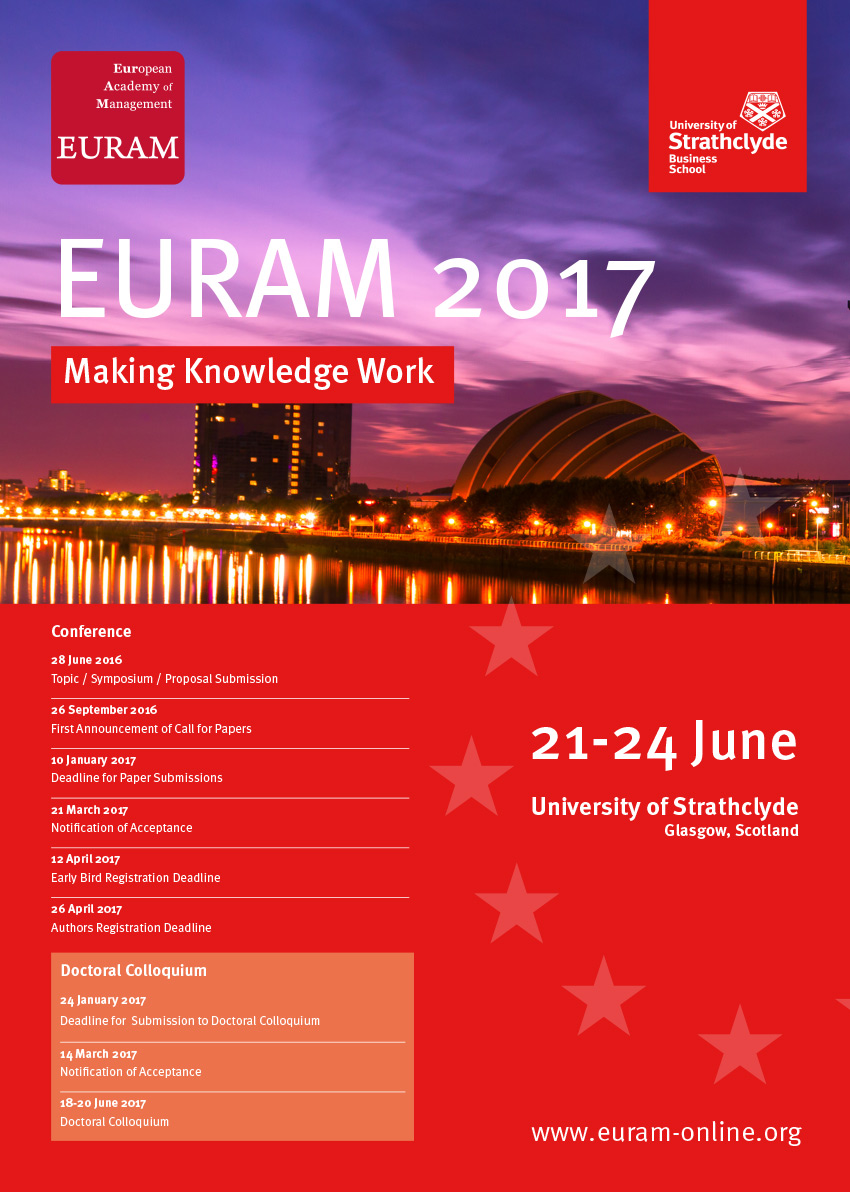23 June Plenary 2
Turbulence met our political world in 2016, though its foundations run long and deep into our histories. Issues such as mass migration, the consequences of BREXIT for the stability of the EU, the rise of plutocratic popularists, the distancing of the ruling elites from angry masses, the growing anti-establishment rhetoric and action, moral outrage and untamed terrorism, inter alia, have erupted to create an environmental complexity that organisations must try and navigate. How do managers make sense of it in their strategic decision making? How do management academics grapple with these issues in their research and teaching? What do these issues mean for the 'freedom' of our roles as academics? This plenary brings together a politicians (the EU President of the Regions) and globally renowned political scientists who will try and make sense of this changing European political landscape for the benefit of management scholars.
Chair: Sibel Yamak (President at European Academy of Management; Panellists: Markku Markkula (President of European Committee of the Regions), Richard Higgott (Institute of European Studies), Sweden), Martine Durand (Organisation for Economic Co-operation and Development), John Curtice (University of Strathclyde, UK).
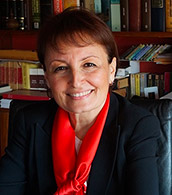 Sibel Yamak is a professor of management at the University of Wolverhampton. She has a doctorate degree in Organization Theory from Bogaziçi University. She has been a permanent and/or visiting scholar at different universities such as Galatasaray University, Dauphine University, Panthéon Sorbonne University, Southampton University and Manchester University among others. She specializes in governance with a special focus on the relationship between business elites and state, contextual antecedents and impact of top management teams, governance and democratisation relationship and genealogy of corporate social responsibility. Her works have been published in peer reviewed journals such as British Journal of Management, Strategic Management Journal, Group and Organization Management, European Management Journal, European Journal of International Management, International Journal of Human Resource Management. She is associate editor of the European Management Review and editorial board member of Society and Business Review. She acted as guest editor of special issues on Corporate Social Responsibility and Top Management Teams for various academic journals. She is actively involved with different academic associations such as Academy of Management where she previously acted as Management Education and Development Division Research Coordinator. She co-founded EIASM Top Management Team Workshops together with a group of scholars. At the European Academy of Management, she performed as Quality Task Force Chair, Corporate Governance Strategic Interest Group Chair and Vice-President. Currently, she is the President of the EURAM.
Sibel Yamak is a professor of management at the University of Wolverhampton. She has a doctorate degree in Organization Theory from Bogaziçi University. She has been a permanent and/or visiting scholar at different universities such as Galatasaray University, Dauphine University, Panthéon Sorbonne University, Southampton University and Manchester University among others. She specializes in governance with a special focus on the relationship between business elites and state, contextual antecedents and impact of top management teams, governance and democratisation relationship and genealogy of corporate social responsibility. Her works have been published in peer reviewed journals such as British Journal of Management, Strategic Management Journal, Group and Organization Management, European Management Journal, European Journal of International Management, International Journal of Human Resource Management. She is associate editor of the European Management Review and editorial board member of Society and Business Review. She acted as guest editor of special issues on Corporate Social Responsibility and Top Management Teams for various academic journals. She is actively involved with different academic associations such as Academy of Management where she previously acted as Management Education and Development Division Research Coordinator. She co-founded EIASM Top Management Team Workshops together with a group of scholars. At the European Academy of Management, she performed as Quality Task Force Chair, Corporate Governance Strategic Interest Group Chair and Vice-President. Currently, she is the President of the EURAM.
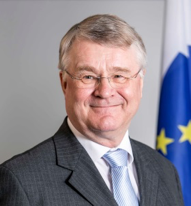 Markku Markkula is the President of the European Committee of the Regions. A long-standing politician, Mr. Markkula has been member of the Espoo City Council since 1980 and is a former member of the Finnish Parliament. Mr. Markkula works at the Aalto University as advisor to Aalto Presidents, where his focus mainly lays on European Union research, innovation and education policy affairs.
Markku Markkula is the President of the European Committee of the Regions. A long-standing politician, Mr. Markkula has been member of the Espoo City Council since 1980 and is a former member of the Finnish Parliament. Mr. Markkula works at the Aalto University as advisor to Aalto Presidents, where his focus mainly lays on European Union research, innovation and education policy affairs.
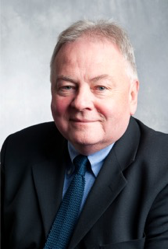 Professor, Richard Higgott an Australian and UK citizen is Research Professor at the Institute of European Studies and Distinguished Professor of Diplomacy at Vesalius College at the Vrije Universiteit Brussel. He is also Emeritus Professor of International Political Economy at the University of Warwick. He has been Professor (International Politics and Public Policy) and Director of Graduate Studies in Foreign Affairs and Trade at the Australian National University and Professor of Government at the University of Manchester before moving to Warwick where he founded and directed the Centre for Globalisation and Regionalisation between 1996-2007. Between 2006 and 2014 he held senior administrative appointments as a Pro Vice Chancellor Research at Warwick and Vice Chancellor at Murdoch University in Western Australia where he failed spectacularly and very publicly to put the academic community back in control of the university. He is now a recovering academic currently researching on an EU Horizon 2020 project on EU Science and Cultural Diplomacy.
Professor, Richard Higgott an Australian and UK citizen is Research Professor at the Institute of European Studies and Distinguished Professor of Diplomacy at Vesalius College at the Vrije Universiteit Brussel. He is also Emeritus Professor of International Political Economy at the University of Warwick. He has been Professor (International Politics and Public Policy) and Director of Graduate Studies in Foreign Affairs and Trade at the Australian National University and Professor of Government at the University of Manchester before moving to Warwick where he founded and directed the Centre for Globalisation and Regionalisation between 1996-2007. Between 2006 and 2014 he held senior administrative appointments as a Pro Vice Chancellor Research at Warwick and Vice Chancellor at Murdoch University in Western Australia where he failed spectacularly and very publicly to put the academic community back in control of the university. He is now a recovering academic currently researching on an EU Horizon 2020 project on EU Science and Cultural Diplomacy.
He has been National Director of the Australian Institute of International Affairs, President of the Australasian Political Science Association and Vice President of the USA International Studies Association. A former Fulbright Fellow at the Kennedy School of Government he is an elected Fellow of the UK Academy of Social Sciences. He has held Distinguished Visiting Professorships at la Fondation Nationale des Science Politiques, (Paris); Stiftung Wissenschaft und Politik, (Berlin); Diplomatische Akademie Marie Therese (Vienna); Chulalongkorn University (Bangkok) and the Rajaratnam School if International Studies, NTU (Singapore). He is a former editor of Global Governance and edited The Pacific Review between 1985-2016. He is author editor of some 20 books and 120+ peer reviewed papers. But in a Trumpian world questions the utility of much of his written work; especially that on multilateralism of the last 20 years.
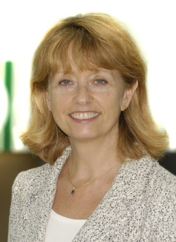
Martine Durand is the Director of Statistics and Chief Statistician of the OECD. She is responsible for providing strategic orientation for the Organisation's statistical policy and oversees all of OECD's statistical activities. She is in particular responsible for the Organisation's work on the measurement of people's well-being and societal progress, promoting the analysis and use of well-being and sustainability indicators for policy-making. This work features regularly in the flagship publication How's Life? and related reports on well-being, inequalities and sustainable development.
She was formerly Deputy-Director of Employment, Labour and Social Affairs where she was responsible for OECD's work on employment and training policies, health and social policies, and international migration published in OECD flagship reports such as the OECD International Migration Outlook, the OECD Employment Outlook, Pensions at a Glance and Health at a Glance.
Prior to that, she was Deputy-Head of the OECD Secretary-General's Private Office where she worked on a number of national and international policy issues requesting the attention of the Secretary-General and his Deputies.
Ms. Durand also worked for many years in the Economics Department on OECD Economic Surveys and the OECD Economic Outlook as well as on policy issues related inter alia to international competitiveness, European integration and labour market performance.
Ms. Durand graduated in mathematics, statistics and economics from the Paris VI University, the Ecole Nationale de la Statistique et de l'Administration Economique (ENSAE) and the University of Wisconsin-Madison. She is married with three children.
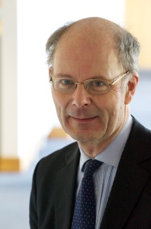
John Curtice is Professor of Politics, University of Strathclyde and Senior Fellow, NatCen Social Research and the ESRC 'UK in a Changing Europe' initiative. His principal research interests are voting behaviour, voting systems and social and political attitudes, and he has been a co-editor of NatCen's British Social Attitudes series since 1994. During and since the EU referendum he has been Chief Commentator at the whatukthinks.org/eu website, which provides a comprehensive collection of data on and analysis of public attitudes towards the EU and the UK's decision to leave the European Union.







